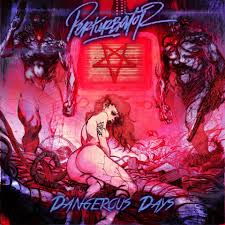There’s a scene in Total Recall (the good one from 1990) where a supposedly deluded (yet unfeasibly built) construction worker played by Arnold Schwarzenegger is surprised by the sudden appearance of a man urgently trying to persuade him that his supposed reality where he’s a secret agent on Mars is in fact a "vacation from himself". Instead, the man says, he’s plugged in at a psychonaut travel agents called Rekall. Schwarzenegger doesn’t buy the shrill warnings about an impending lobotomy and puts a bullet in his supposed saviour’s head and the movie ends by implying that the visitor was right and our hero is consequentially lobotomised in the Rekall chair.
On Dangerous Days, James Kent’s chosen Rekall vacation is that of Nocturne City circa 2088; a dystopian cyberpunk nightmare. Kent has projected himself into the role of The Perturbator; the archetypal anti-hero, and this world is constructed – like Schwarzenegger’s – to fulfill his own secret power fantasies, filled with the most evocative moments from his memory of the films, games and music he loves. Kent’s been in the Rekall chair for about three years by my reckoning, so enmeshed with technology to the extent that he’s yet to play live. In that time, he’s self-released a string of albums and EPs covering the gamut of 80s influences and subsequent later unearthings; slasher movies (Night Driving Avenger), through to neon lit cliches Florida based neon and pastel underworld adventures from Scarface to Drive (Sexualizer EP). But these are just minor deviations from the main Perturbator fantasy, with prior albums Terror 404, I Am The Night and Nocturne City all contributing to the coherent 2088 world that is Dangerous Days.
In this latest outing, our unreconstructed hero is facing Satan himself, downloaded onto a computer, bent on eradicating mankind. No, really. Sonically, the result is almost exactly what you expect, pulling core influences that include Moroder, Vangelis, Tangerine Dream, John Carpenter, the Knight Rider theme and The Terminator‘s Brad Fiedel. Kent’s intention seems to be to not just deliver a po-faced retro recreation of his influences, but to create something marrying the period’s musical tropes and soundtrack conventions to subsequent musical developments (most notably modern EDM and metal), all constructed with a laptop full of emulators and an infinite number of plug-ins.
‘Welcome Back’ ominously opens the scene, synths swirling before our anti-hero arrives, meting out justice through martial beats and hyperactive arpeggios in ‘Perturbator’s Theme’. ‘Raw Power’ is the sound of a splattery shootout, ‘Future Club’ a glorious banger. ‘War Against Machines’ is self explanatory and suitably straight in evoking Fiedel’s Terminator soundtracks. ‘Hard Wired’ seemingly captures the narrative’s inevitable loveless encounter with a sexbot (a very Dave Gahan sounding one at that), before leaving the assassinated android to embark on film’s main chase sequence, in the following ‘She Is Young, She Is Beautiful, She Is Next’ (naturally rendered in 16 bit). ‘Humans Are Such Easy Prey’ opens with Kent dropping his punitive serious facade for a second, allowing himself to lift a dialogue line from Michael Biehn in the Terminator before releasing the binds of an unstoppable machine.
The remainder of the "soundtrack" leads us inexorably through expected genre conventions, as an infiltration (‘Minuit’) that goes wrong (‘Satanic Rites’) culminates in a second act humiliation by the villain and our hero’s lowest ebb (‘Complete Domination’). A plea from the not infact dead Gahan-bot (‘Last Kiss’) is in vain as Perturbator "does what has to be done" and faces down ZX Satan in a cataclysmic Pyrrhic victory in the 12 minute finale and title track. By the end, much like manga classic Akira, millions may be dead, but the day is won.
Unashamed power fantasies are mostly given short shrift in the music or film world in the present day, but in areas such as gaming, they’re still pretty much a core component in making games work as a medium, and as a result the continual target of idiots such as MP Keith Vaz and Daily Mail parental responsibility deniers. These links to gaming culture explain a lot of what makes Dangerous Days work without descending into the murky and disreputable realm of irony, instead securing Kent a lavish release on respected metal label Blood Music.
Like the best sci-fi and fantasies, seriousness and suspension of disbelief is what makes the entire affair work, especially if your reconstruction involves thematically faithful female objectification in the form of lurid artwork of women in danger, megalomaniacs and rippling ubermensch. A cheeky ironic wink to such sleazy staples would be a cowardly arse-covering and the lowest in Thicke-esque apologism. If you’re going to do it at all, do it seriously. Indeed when it comes to buying into Kent’s world, if you’ve read this far and can’t conceive of allowing yourself occasionally to take seriously the concept of a cyberpunk vigilante fighting a devil computer then you probably never will. By working to replace the musical equivalents of shoddy special effects that would instead hint he’s not experiencing reality and would instead shatter the illusion, Kent as Perturbator has gone one better, and taken all steps to ensure his fantasy is believable as possible. Like Schwarzenegger, he’s marooned in a chair at Rekall, having the time of his life. With no chance of being pulled back out.
<div class="fb-comments" data-href="http://thequietus.com/articles/15765-perturbator-dangerous-days-review” data-width="550">


